Man With Shaky Repayment History Begs Friend for Dog's Life-Saving Surgery Loan
A Redditor found herself stuck between a rock and a hard place. OP could either lend her friend money and risk him not paying it back or refuse and risk his dog succumbing to cancer.
OP's friend, Alex, seemed desperate when he contacted her to ask for financial aid. His dog was diagnosed with cancer, and the recommended treatment was surgery.
Alex could not afford the surgery. OP had enough savings to cover the cost, but she was worried that Alex would not pay her back.
OP stated that Alex had a history of being reckless and unreliable with the money lent to him. He was known to make impulsive decisions and was irresponsible when repaying borrowed money.
OP expressed her sympathies for Alex and his dog. However, she couldn't risk losing a significant amount of money, despite how worthy the cause was.
OP knew her decision was reasonable, but she could not shake off her guilt no matter how hard she tried. It was unthinkable to leave Alex and his dog in such a desperate situation.
For her peace of mind, OP asked Redditors to weigh in on whether she was a jerk for prioritizing her financial security over the life of her friend's dog. Should OP risk lending Alex the money to treat his dog?
What Would You Have Done If You Were in OP's Shoes?
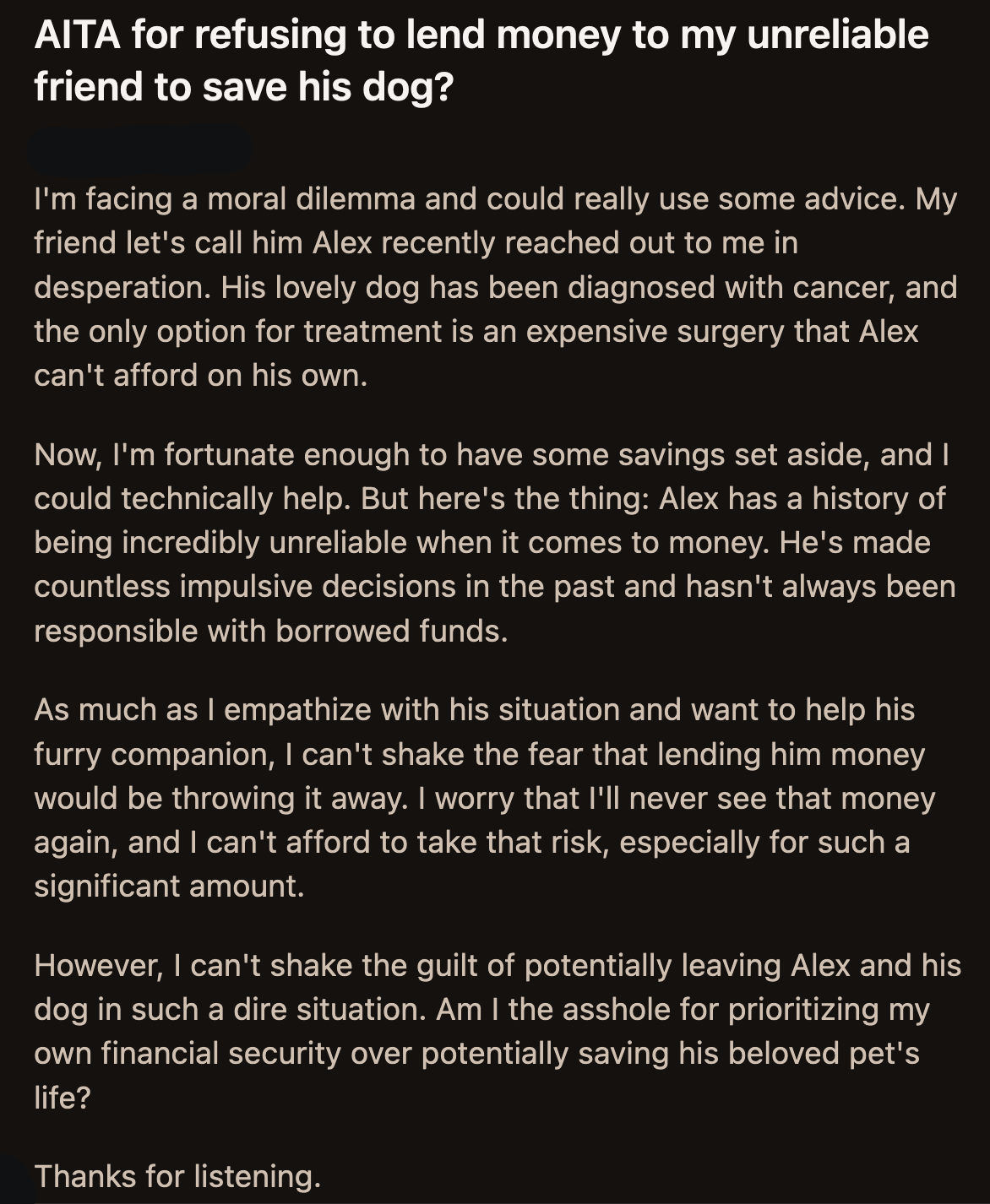
Even Dog Lovers Didn't Judge OP for Her Decision. They Said They Would Sell Their Earthly Possessions to Save Their Dog, but the Reality Is Most Cancer Treatments Do Not Present a Positive Outlook for Dogs.

The Emotional Weight of Financial Decisions
The request for a loan for a dog's life-saving surgery highlights the emotional complexities tied to financial decisions. As Dr. William Doherty, family therapist, notes, "Financial stress can amplify emotional responses, often leading individuals to make decisions that may not align with their best interests." This emotional burden can become even more pronounced when the stakes involve the health of a beloved pet. For the man in this situation, the urgency of his dog's health crisis may overshadow his previous financial irresponsibility, creating a conflict between his emotional attachment to his pet and a rational assessment of his financial capabilities.
People Always Say Only Lend Money That You Are Prepared to Lose. There Is Always a Chance That the Person Wouldn't Repay. Based on Alex's History, OP Wouldn't See Her Money Again If She Loans It to Him.
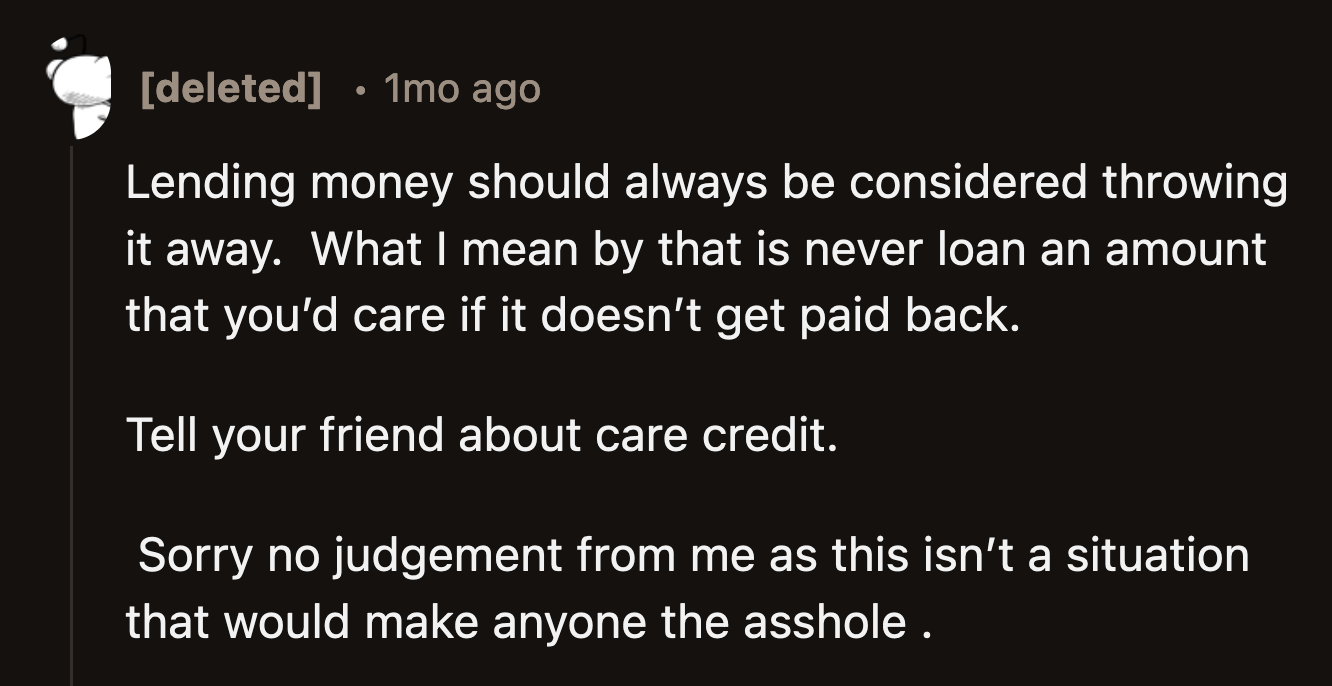
Could Alex Be Lying About His Dog's Health to Get Money from His Friends? Is He Willing to Go That Low?

Additionally, the dynamics of friendship can complicate these requests. Research from the University of Chicago indicates that financial requests within friendships can strain relationships, especially if there’s a history of financial irresponsibility. This underscores the importance of evaluating the potential impact on both parties before proceeding with such requests.
If He Was Being Truthful, His Dog Is Still His Responsibility.

Lending a Friend Money Means Risking the Stability of the Relationship as Well.

Navigating Difficult Conversations
When approaching sensitive topics like financial loans, effective communication is crucial. Utilizing strategies such as expressing gratitude for past support and acknowledging the friend's concerns can pave the way for a more constructive conversation. Establishing a timeline for repayment and demonstrating a commitment to improving financial habits can also help assuage the friend's fears.
Additionally, outlining a clear plan for the dog's care after the surgery can provide reassurance and demonstrate responsibility, fostering trust between the two parties.
It's Okay to Rely on Family and Friends When Times Get Rough. Alex Wasn't Wrong to Ask OP for Help, and OP Wouldn't Be a Jerk If She Couldn't Afford the Assistance Alex Needs.

Did Alex Try All He Could to Pay for His Dog's Surgery Before He Asked OP to Fund It?
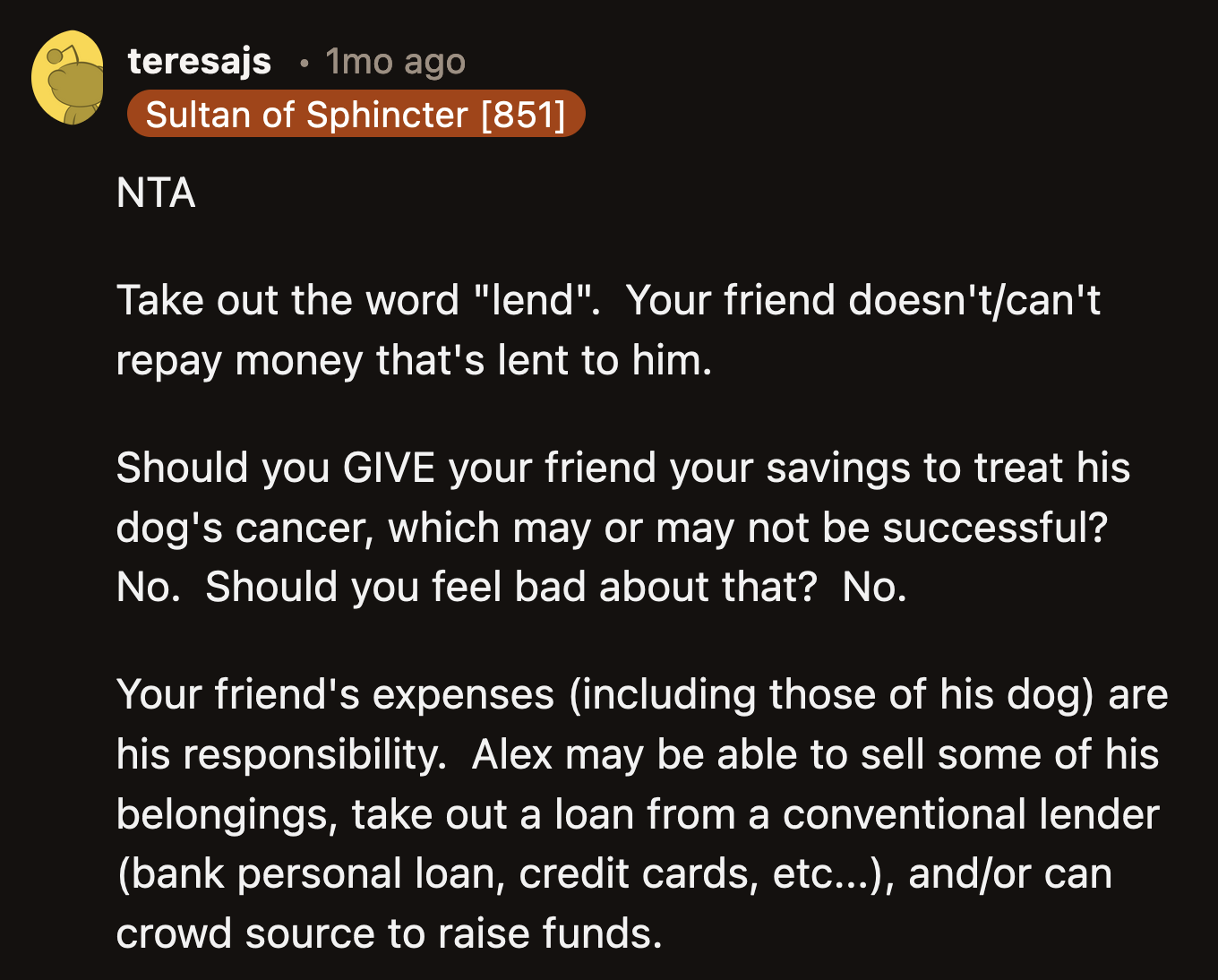
A contract is needed if OP is going to lend Alex a significant amount of cash. OP wouldn't be a bad person if she decided not to give Alex the money, especially if it put a huge dent in her savings.
The situation is sad overall. Ideally, pet owners need to be prepared to pay for all of their pets' expenses, but Alex shouldn't be shamed for asking for help in such a dire situation.
If the Surgery Is Unsuccessful, Would There Be Any Guarantee He Would Still Pay OP Back?
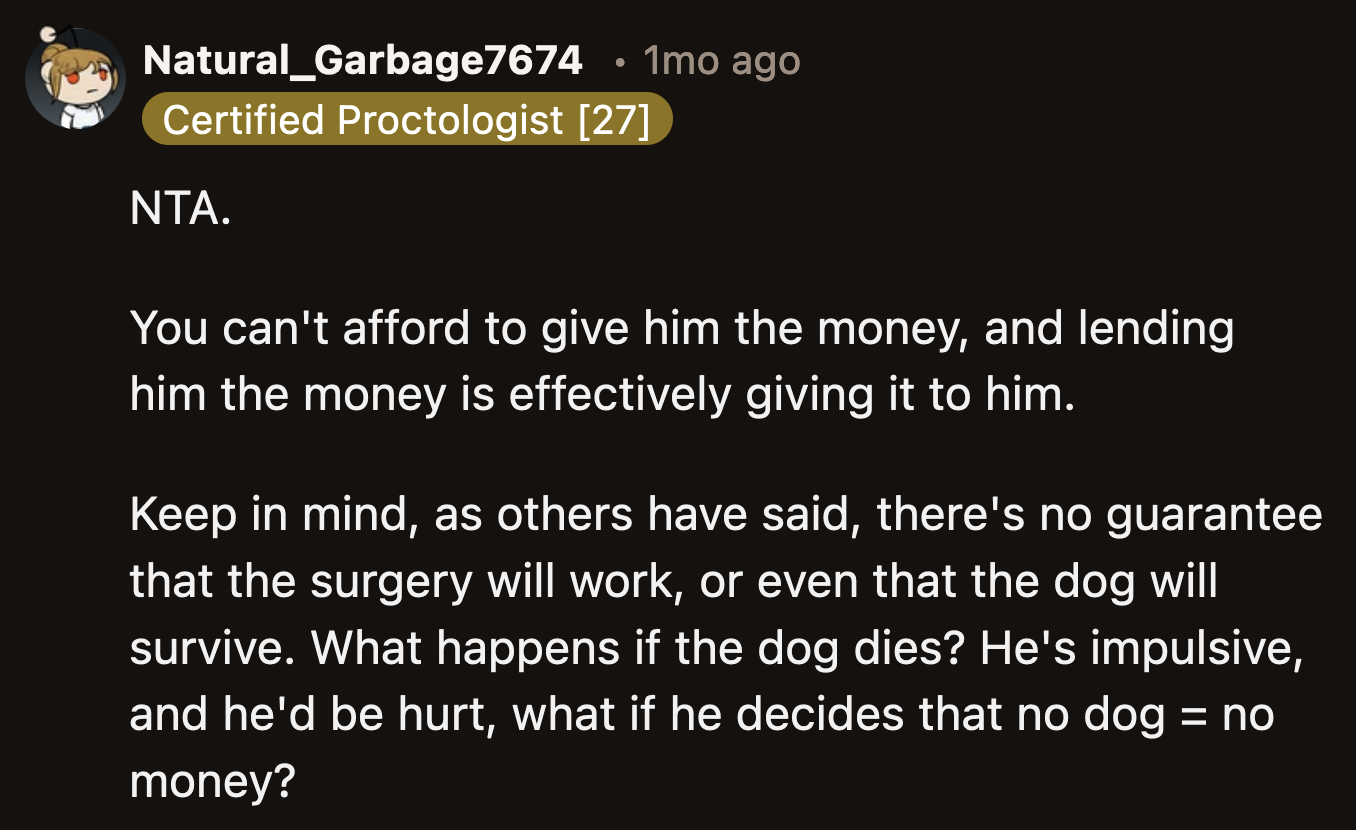
If OP Feels She Needs to Help Alex in Some Way, She Could Lend Him a Fraction of the Cost—Only an Amount She Would Be Comfortable Losing.
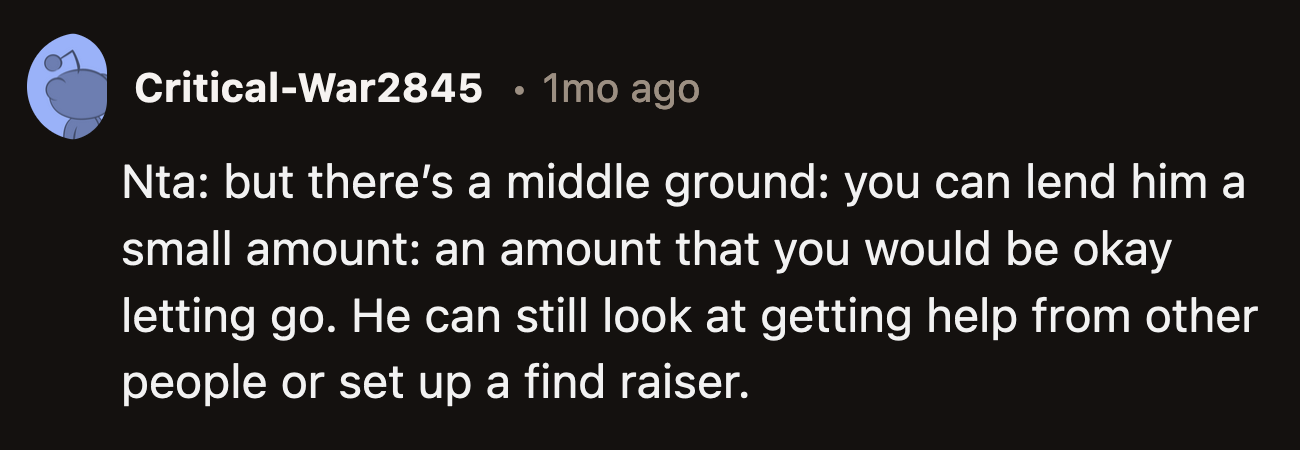
Moreover, exploring alternative avenues for funding, such as crowdfunding or local pet charities, can alleviate the burden on both friends while still aiming to save the pet's life. This approach would not only show initiative and responsibility but also strengthen the man's support network, enhancing his social capital in times of need.
However, If She Felt Compelled to Fund the Life-Saving Surgery, She Could Contact the Clinic and Pay Directly to Ensure the Money Went to Where It Was Supposed to Go.
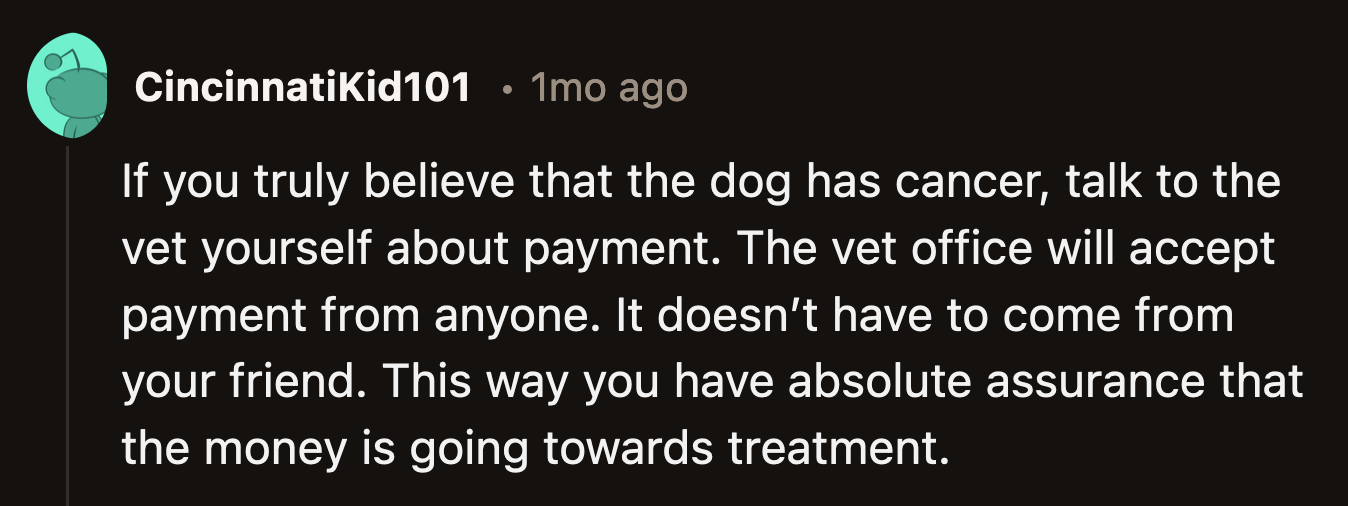
Psychological Analysis
This scenario showcases the emotional complexity involved in asking for financial help, particularly when it intersects with past behaviors. It's essential for individuals in such situations to communicate openly and honestly while also being aware of the potential strain on friendships that such requests can create.
Analysis generated by AI
Analysis & Alternative Approaches
Ultimately, this situation illustrates the delicate balance between emotional attachment and financial responsibility. By fostering open communication and exploring various funding options, the man can navigate the complexities of his request while preserving his friendship and ensuring the best outcome for his pet.



